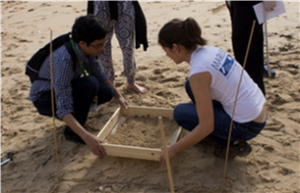 Though Portugal is well-known for its scenic beaches and landscapes, many overlook the tremendous work that goes into ensuring that they stay safe and clean. Isabel Palma Raposo is among a handful of dedicated staff from MARLISCO, a European organization that aims to bring awareness to issues of marine litter and ways in which the public can help make their beaches waste-free.
Though Portugal is well-known for its scenic beaches and landscapes, many overlook the tremendous work that goes into ensuring that they stay safe and clean. Isabel Palma Raposo is among a handful of dedicated staff from MARLISCO, a European organization that aims to bring awareness to issues of marine litter and ways in which the public can help make their beaches waste-free.
Among the many beaches Raposo works in is Conceição Beach, a small beach in Cascais. Although the beach is cleaned every day, regular monitoring reveals that some small pieces of waste still end up on land.
“The type of litter you find on a beach can tell you a lot about its users’ habits,” says Raposo. “If you take a look at the litter that ends up here in Conceição, most of the litter comes from cigarette butts, cotton bud sticks, and string from fishing poles. Many residents have a tendency to stick their cigarettes into the sand or to throw their cotton buds into the toilet, which then end up in the ocean.”
Raposo and her colleagues use a number of techniques to monitor the amount and type of waste that ends up on beaches. One of the techniques involves sectioning off a square metre of sand, followed by passing an inch of sand through the sieve. The sand filters through, leaving only small pellets of plastic, known as microplastics, which often originate from exfoliant and cosmetic products. These materials are harmful to the fish and other wildlife that ingest them, which can also harm the humans that consume these fish.
Many locals praised the work that goes into keeping their beaches clean. “I’ve been to this beach practically every day for the past 20 years, and I can definitely say that there’s a lot of effort into making sure these beaches are all clean and safe for us to use,” says Martina Otterlei, a local journalist. “Over the years, the conditions have been improving, and thanks to the help of organizations like MARLISCO, I’m confident that things will only look up from here.”
“A lot of it has to do with habits and making people aware that they can play a big role in minimizing the waste that ends up on beaches,” says Raposo. “Once we all start acting more sensibly with our waste, we all benefit.”
Group 2: Christoph Barg, Lea Eggers, Tatyana Gubanova, Gaganbir Dhugga, Alan Binlayo, Anastasija Bojkovska, Sara Cascais.



You must be logged in to post a comment.